The 38-Minute Life Lesson
Cabbie’s story makes us all inventory our happiness.
I was trying to beat the Chicago traffic to the airport late one afternoon when I hopped into Abe’s cab, never thinking I would come away learning one of the greatest life lessons.
“Let’s get you home,” Abe said as he pulled away from the curb and we headed toward Midway Airport. Abe is not his real name, but he is real—I didn’t ask his permission to use his real name, so I won't. He is 50-ish with a big, smiley face.
“Did you watch the presidential debate last night?” he asked in his thick African accent, a question which I assumed he tossed out as a conversation starter. “Wasn’t that great? I love this country, man, when you can get people on stage like that and ask them all kinds of stuff. I loved it.”
With that, I asked him where he was from and how long he had been in the U.S. He came from Nigeria, he said, and it was going on 30 years for him to call Chicago home.
“I love it here. The U.S. is such a great country. There are three things you need to have to be successful here: one is integrity, the second is a hard work ethic, and the third is perseverance. You don’t want to give up, or you’re sunk. Keep at it, keep trying, keep working hard.”
Abe told me he left his parents and three brothers in Africa to come to the U.S. to get a job and an education. Two of his brothers now live in England, and the other in Russia. Though his father has passed, he goes home every other year for about four months to see his 91-year-old mother.
Three years ago, he flew her to the U.S. to stay with his wife and three sons. He had a secret plan to get her to stay, telling her the visit would be for three months, but hoping she would make it permanent.
“She was amazed by everything in this country,” Abe said. “The people, the traffic, the food. She couldn’t believe what she saw.”
At first his mom said she would stay longer, but near the three-month mark she woke him up in the middle of the night to tell him she wanted to go home.
“I wanted to give her anything she need, to take care of my momma,” he said. “But she stood there with this look on her face, and it was sad. She missed her church and her friends, and she knew that is where she needed to be. I was sad, but what can you do? She went home, but I had her make me a big pot of butter soup which I ate for a month. But I miss her.”
Abe has a view of Americans that many won’t like, and others will want to hug him for. He has strong opinions.
“Some people in this country are such whiners,” he said. “Always looking for a handout, always complaining about what they don’t have. Complain, complain. I don’t understand why they complain when they can have everything if they work hard for it.”
Abe came to the U.S. and worked for a bank as he went through community college in Chicago. He soon met a registered nurse whom he married and had three sons. He started driving a cab a few years ago because he could set his own hours. On the day he drove me, he started work at 4 a.m. and was still going strong 12 hours later.
“My sons ask me for money, and I tell them ‘you will have to earn it,’” he said. “They want $5, then they can wash my car and I will give them $2.50. I don’t want them thinking anything is free. In all my years here, I’ve never taken a penny from the government. I wouldn’t want it. I am healthy, and I can work.”
Four years ago, a rider left his briefcase in Abe’s cab. When Abe found it later, he opened it in hopes of finding the name of the passenger. Inside, he found an envelope with $19,000 in cash. Abe told no one, not even his boss. Instead, he drove to the man’s house in Schaumburg and knocked on the door. The man’s wife answered, and said her husband was frantically trying to find his briefcase. He turned it over to her and drove home.
A few weeks later, Abe was called in to see his manager at the cab company.
“Nothing good happens when you get called in to see the boss,” he said. “There were four men from the company sitting there. One of them handed me an envelope. It was a check for $2,000 from the man who lost his briefcase. I was shocked. Wouldn’t everyone turn the money in? It wasn’t my money. Somebody worked hard for that money. But I took the check anyway.”
A year or so later, Abe was accused by a few men of being rude when he drove them in his cab. Abe said they were drunk and that they were actually abusive to him. He pulled over and asked them to leave his cab. He was called into a hearing where the men made accusations. The head of the disciplinary committee recognized Abe from hearing about the $19,000 he found, and dismissed the complaint.
“It’s all about integrity,” Abe said. “People know me and know what I am all about. I work hard, I own my home, I have a wonderful wife and great sons, and I live in this great country. I am a very lucky man.”
I looked at my watch as I exited his cab, and 38 minutes had passed while I heard Abe’s story. I, too, was a lucky man.
Originally published in the February 2016 issue.
RELATED CONTENT
-
Nickel Electroplating
Applications, plating solutions, brighteners, good operating practices and troubleshooting.
-
Plating Q&A: Can you color stainless steel?
Our expert, Art Kushner, says yes, you can color stainless steel, but it is not a process that is typically performed in a plating shop. Read more about his answer.
-
Sizing Heating and Cooling Coils
Why is it important for you to know this?















